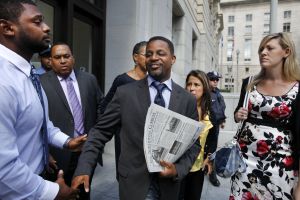
Washington is on the brink of political paralysis because of a series of corruption cases that have undermined the government’s credibility, which elected only two years ago. The capital has already lived through a similar crisis in the nineties. Washington’s new mayor, the Democrat Vincent G. Gray, is going through a federal investigation. For the first time since D.C. acquired its autonomy 38 years ago, two chancellors have lost their offices, accused of fraud and misappropriation of funds.
The district’s attorney has started to investigate Gray in March 2011 after one of his contenders in the elections, Sulaimon Brown, said that he had paid him to run for mayor in 2010 to discredit then mayor Adrian M. Fenty. Months later, Brown had a place as an advisor of the mayor. Some weeks ago, two members of Gray’s campaign admitted to having diverted funds toward Brown’s campaign.
Fenty had only one period in office and was a very popular mayor in the wealthiest districts of Washington. In these districts, however, there are not a great number of voters, since its residents often work in embassies and international institutions and are not registered to vote in the capital. In the predominantly African-American areas, on the other hand, they accused the former mayor of ignoring the increasing poverty in which they lived. Ever since Gray took over the city hall, suspects of corruption of his administration do nothing but increase. Apart from an alleged irregular financial campaign, the press has denounced cases of nepotism and bonuses for allied officials.
This Wednesday, Kwame Brown, the president of Washington D.C.’s city council, holder of the second most important position after the governor, resigned. Brown had been charged with fraud during 2005 and 2006 and for breaking the electoral laws of the circumscription in municipal elections of 2008. His resignation happened five months after Harry Thomas Jr., another elected council member of the Capital’s local government, was caught appropriating $350,000 of municipal funds for his personal benefit. Thomas has been sentenced to prison.
Brown, in city hall since 2004, decided to align with Gray in the municipal elections of 2010 to overtake Fenty, whom they accused of ruling only for whites. With Gray’s victory, Brown positioned himself as his successor. Everyone saw this ambitious 41 year-old politician—concerned about coming across as a progressive African-American, in favor of homosexual marriage, that felt equally comfortable in the suburbs as he felt in the residential neighborhoods—as the perfect generational turnover for the current ruler. Brown, like Fenty and Gray, is a member of the Democrat Party. In Washington, the presence of Republicans is marginal.
Brown’s resignation has ignited questions about the future of the local administration. If Gray was to end up imputed, as the Washington Post quoted sources as saying within city hall, the municipal elections would be scheduled alongside the presidential elections this upcoming Nov. 6. Since 1974, when autonomy was granted to the District of Columbia, the local government has been carefully watched. Its capacity to manage the capital’s economy independently has been questioned.
After the nineties’ scandals, the consistency seems to have renewed trust in congressmen, who were willing to increase the budget. (The District of Columbia, which encompasses the capital, has representation in the congress, but not the ability to vote.) These new scandals can break a good symphony in a moment when the city is immersed in full economic recovery.

Leave a Reply
You must be logged in to post a comment.